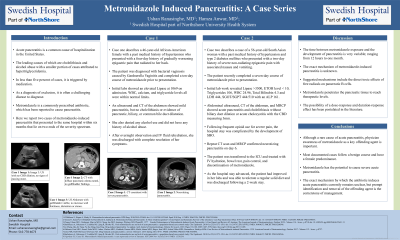Sunday Poster Session
Category: Biliary/Pancreas
P0158 - Metronidazole-Induced Acute Pancreatitis: A Case Series
Sunday, October 22, 2023
3:30 PM - 7:00 PM PT
Location: Exhibit Hall

Has Audio

Ushan A. Ranasinghe, MD, MS
Swedish Hospital, part of Northshore University Health System
Chicago, IL
Presenting Author(s)
Ushan A. Ranasinghe, MD, MS, Hamza Anwar, DO
Swedish Hospital, part of Northshore University Health System, Chicago, IL
Introduction: Acute pancreatitis is a common cause of hospitalization in the United States. In under five percent of cases, it is triggered by medication. Metronidazole, a commonly prescribed antibiotic, has been reported to cause pancreatitis in the literature. Here we report two cases of metronidazole-induced pancreatitis that presented to the same hospital within six months that lie on two ends of the severity spectrum.
Case Description/Methods: Case one describes a 46-year-old African-American female with a past medical history of hypertension who presented with a four-day history of worsening epigastric pain which radiated to her back. The patient was diagnosed with bacterial vaginosis and completed a ten-day course of metronidazole prior to presentation. Initial labs showed an elevated Lipase at 1069 on admission. WBC, calcium, triglyceride and liver enzyme levels were all were within normal limits. An ultrasound and CT of the abdomen showed mild pancreatitis, but no cholelithiasis or evidence of pancreatic, biliary, or common bile duct dilatation. She also denied any alcohol use. After overnight observation and IV fluid rehydration she was discharged with complete resolution of her symptoms.
Case two describes a case of a 56-year-old South Asian woman with a past medical history of hypertension and type 2 diabetes mellitus who presented with a two-day history of severe non-radiating epigastric pain with associated nausea and vomitting. The patient recently completed a seven-day course of metronidazole prior to presentation. Initial lab work revealed Lipase >3500, alcohol level < 10, Triglycerides 106, WBC 24.96, Tbili 4.3 and LDH 444, SGOT/SGPT 444/510 with an ALP 161. Abdominal ultrasound, CT of the abdomen and MRCP showed acute pancreatitis and cholelithiasis without biliary duct dilation or acute cholecystitis with the CBD measuring 3mm. Repeat CT scan and MRCP confirmed necrotizing pancreatitis. The patient was transferred to the ICU and treated ith IV hydration, bowel rest, pain control, and discontinuation of metronidazole.
Discussion: Although a rare cause of acute pancreatitis, physician awareness of metronidazole as a key offending agent is important. The majority of cases in the literature follow a benign course and have a female predominace1 ; however, it has the potential to cause severe disease. The exact mechanism by which the antibiotic induces acute pancreatitis currently remains unclear, but prompt identification and removal of the offending agent is the cornerstone of management.
Disclosures:
Ushan A. Ranasinghe, MD, MS, Hamza Anwar, DO. P0158 - Metronidazole-Induced Acute Pancreatitis: A Case Series, ACG 2023 Annual Scientific Meeting Abstracts. Vancouver, BC, Canada: American College of Gastroenterology.
Swedish Hospital, part of Northshore University Health System, Chicago, IL
Introduction: Acute pancreatitis is a common cause of hospitalization in the United States. In under five percent of cases, it is triggered by medication. Metronidazole, a commonly prescribed antibiotic, has been reported to cause pancreatitis in the literature. Here we report two cases of metronidazole-induced pancreatitis that presented to the same hospital within six months that lie on two ends of the severity spectrum.
Case Description/Methods: Case one describes a 46-year-old African-American female with a past medical history of hypertension who presented with a four-day history of worsening epigastric pain which radiated to her back. The patient was diagnosed with bacterial vaginosis and completed a ten-day course of metronidazole prior to presentation. Initial labs showed an elevated Lipase at 1069 on admission. WBC, calcium, triglyceride and liver enzyme levels were all were within normal limits. An ultrasound and CT of the abdomen showed mild pancreatitis, but no cholelithiasis or evidence of pancreatic, biliary, or common bile duct dilatation. She also denied any alcohol use. After overnight observation and IV fluid rehydration she was discharged with complete resolution of her symptoms.
Case two describes a case of a 56-year-old South Asian woman with a past medical history of hypertension and type 2 diabetes mellitus who presented with a two-day history of severe non-radiating epigastric pain with associated nausea and vomitting. The patient recently completed a seven-day course of metronidazole prior to presentation. Initial lab work revealed Lipase >3500, alcohol level < 10, Triglycerides 106, WBC 24.96, Tbili 4.3 and LDH 444, SGOT/SGPT 444/510 with an ALP 161. Abdominal ultrasound, CT of the abdomen and MRCP showed acute pancreatitis and cholelithiasis without biliary duct dilation or acute cholecystitis with the CBD measuring 3mm. Repeat CT scan and MRCP confirmed necrotizing pancreatitis. The patient was transferred to the ICU and treated ith IV hydration, bowel rest, pain control, and discontinuation of metronidazole.
Discussion: Although a rare cause of acute pancreatitis, physician awareness of metronidazole as a key offending agent is important. The majority of cases in the literature follow a benign course and have a female predominace1 ; however, it has the potential to cause severe disease. The exact mechanism by which the antibiotic induces acute pancreatitis currently remains unclear, but prompt identification and removal of the offending agent is the cornerstone of management.
Disclosures:
Ushan Ranasinghe indicated no relevant financial relationships.
Hamza Anwar indicated no relevant financial relationships.
Ushan A. Ranasinghe, MD, MS, Hamza Anwar, DO. P0158 - Metronidazole-Induced Acute Pancreatitis: A Case Series, ACG 2023 Annual Scientific Meeting Abstracts. Vancouver, BC, Canada: American College of Gastroenterology.
